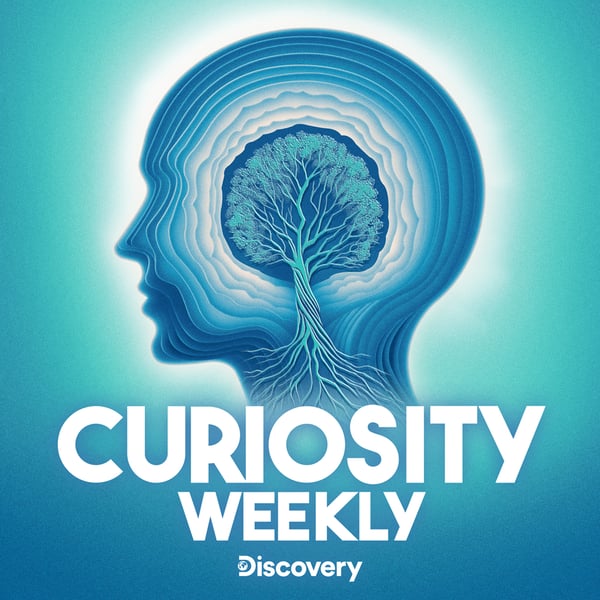No One Born Blind Has Had Schizophrenia, Bacteria Engineered to Protect Honeybees, and The Surprising Way WWI Helmets Beat Modern Ones
Curiosity Weekly
Warner Bros. Discovery
4.6 • 935 Ratings
🗓️ 24 March 2020
⏱️ 10 minutes
🧾️ Download transcript
Summary
Learn about a medical mystery involving blindness and schizophrenia; a new bacteria scientists developed to help protect honeybees; and the surprising strength of helmets used in World War I.
No person who was born blind has ever been diagnosed with schizophrenia by Andrea Michelson
- Love, S. (2020, February 11). People Born Blind Are Mysteriously Protected From Schizophrenia. Vice; vice. https://www.vice.com/en_uk/article/939qbz/people-born-blind-are-mysteriously-protected-from-schizophrenia
- Morgan, V. A., Clark, M., Crewe, J., Valuri, G., Mackey, D. A., Badcock, J. C., & Jablensky, A. (2018). Congenital blindness is protective for schizophrenia and other psychotic illness. A whole-population study. Schizophrenia Research, 202, 414–416. https://doi.org/10.1016/j.schres.2018.06.061
- Silverstein, S. M., Wang, Y., & Keane, B. P. (2013). Cognitive and Neuroplasticity Mechanisms by Which Congenital or Early Blindness May Confer a Protective Effect Against Schizophrenia. Frontiers in Psychology, 3. https://doi.org/10.3389/fpsyg.2012.00624
- Steve Silverstein’s chart tracking skills associated with blindness and schizophrenia: https://www.frontiersin.org/files/Articles/40106/fpsyg-03-00624-r2/image_m/fpsyg-03-00624-t001.jpg
- Prediction of adult-onset schizophrenia from childhood home movies of the patients | American Journal of Psychiatry. (2020). American Journal of Psychiatry. https://ajp.psychiatryonline.org/doi/abs/10.1176/ajp.147.8.1052?journalCode=ajp&
- Pollak, T. A., & Corlett, P. R. (2019). Blindness, Psychosis, and the Visual Construction of the World. Schizophrenia Bulletin. https://doi.org/10.1093/schbul/sbz098
Scientists have engineered bacteria to protect honeybees from colony collapse by Grant Currin
- Bacteria Engineered to Protect Bees from Pests and Pathogens - UT News. (2020, January 30). UT News. https://news.utexas.edu/2020/01/30/bacteria-engineered-to-protect-bees-from-pests-and-pathogens/
- Leonard, S. P., Powell, J. E., Perutka, J., Geng, P., Heckmann, L. C., Horak, R. D., Davies, B. W., Ellington, A. D., Barrick, J. E., & Moran, N. A. (2020). Engineered symbionts activate honey bee immunity and limit pathogens. Science, 367(6477), 573–576. https://doi.org/10.1126/science.aax9039
- Ramsey, S. D., Ochoa, R., Bauchan, G., Gulbronson, C., Mowery, J. D., Cohen, A., Lim, D., Joklik, J., Cicero, J. M., Ellis, J. D., Hawthorne, D., & vanEngelsdorp, D. (2019). Varroa destructor feeds primarily on honey bee fat body tissue and not hemolymph. Proceedings of the National Academy of Sciences, 116(5), 1792–1801. https://doi.org/10.1073/pnas.1818371116
- US EPA,OCSPP. (2013, August 29). Colony Collapse Disorder | US EPA. US EPA. https://www.epa.gov/pollinator-protection/colony-collapse-disorder
WWI helmets protected against shock waves as well as modern ones by Steffie Drucker
- WWI helmets protect against shock waves just as well as modern designs. (2020). EurekAlert! https://www.eurekalert.org/pub_releases/2020-02/du-whp021420.php
- Op ‘t Eynde, J., Yu, A. W., Eckersley, C. P., & Bass, C. R. (2020). Primary blast wave protection in combat helmet design: A historical comparison between present day and World War I. PLOS ONE, 15(2), e0228802. https://doi.org/10.1371/journal.pone.0228802
Subscribe to Curiosity Daily to learn something new every day with Cody Gough and Ashley Hamer. You can also listen to our podcast as part of your Alexa Flash Briefing; Amazon smart speakers users, click/tap “enable” here: https://curiosity.im/podcast-flash-briefing
Find episode transcript here: https://curiosity-daily-4e53644e.simplecast.com/episodes/no-one-born-blind-has-had-schizophrenia-bacteria-engineered-to-protect-honeybees-and-the-surprising-way-wwi-helmets-beat-modern-ones
Hosted on Acast. See acast.com/privacy for more information.
Transcript
Click on a timestamp to play from that location
| 0:00.0 | Hi, you're about to get smarter in just a few minutes with Curiosity Daily from Curiosity.com. |
| 0:06.3 | I'm Cody Goth. And I'm Ashley Hamer. |
| 0:08.4 | Today you learn about a medical mystery involving blindness and schizophrenia, a new bacteria |
| 0:13.8 | scientists develop to help honey bees, and the surprising |
| 0:16.9 | strength of helmets used in World War I. |
| 0:19.4 | What satisfy some curiosity? |
| 0:21.9 | No one who was born blind has ever been diagnosed with schizophrenia. |
| 0:27.0 | And scientists don't know why. |
| 0:30.0 | This medical mystery goes against everything that's known about blindness and psychosis. |
| 0:35.1 | In an article for Vice, science journalist Shayla Love explained that most factors that cause people |
| 0:39.9 | to be born blind should actually increase the risk of developing schizophrenia. |
| 0:45.0 | Vision abnormalities that develop later in life also seem to have a link with schizophrenia. |
| 0:49.8 | Unusual eye movements or retina problems make it more likely for someone to develop the disorder. |
| 0:55.0 | Still, scientists have scoured data sets encompassing as many as half a million children, |
| 1:00.0 | and they have yet to find a single case of a person who was born blind developing schizophrenia. |
| 1:07.0 | But while scientists don't have an explanation, they do have some theories. |
| 1:11.0 | One theory, blindness comes with some unique neurological advantages, and many of them match up with the deficits associated with schizophrenia. |
| 1:20.0 | People born blind typically perform better on hearing tasks compared to sighted people, |
| 1:25.5 | probably because their brains repurpose the space usually devoted to visual information for those other senses. |
| 1:31.5 | That ability for the brain to adapt is called |
| 1:34.0 | neuroplasticity and it may explain why blind people might also have stronger |
| 1:39.0 | working memories or quicker reaction times to sound or touch. |
... |
Please login to see the full transcript.
Disclaimer: The podcast and artwork embedded on this page are from Warner Bros. Discovery, and are the property of its owner and not affiliated with or endorsed by Tapesearch.
Generated transcripts are the property of Warner Bros. Discovery and are distributed freely under the Fair Use doctrine. Transcripts generated by Tapesearch are not guaranteed to be accurate.
Copyright © Tapesearch 2025.

